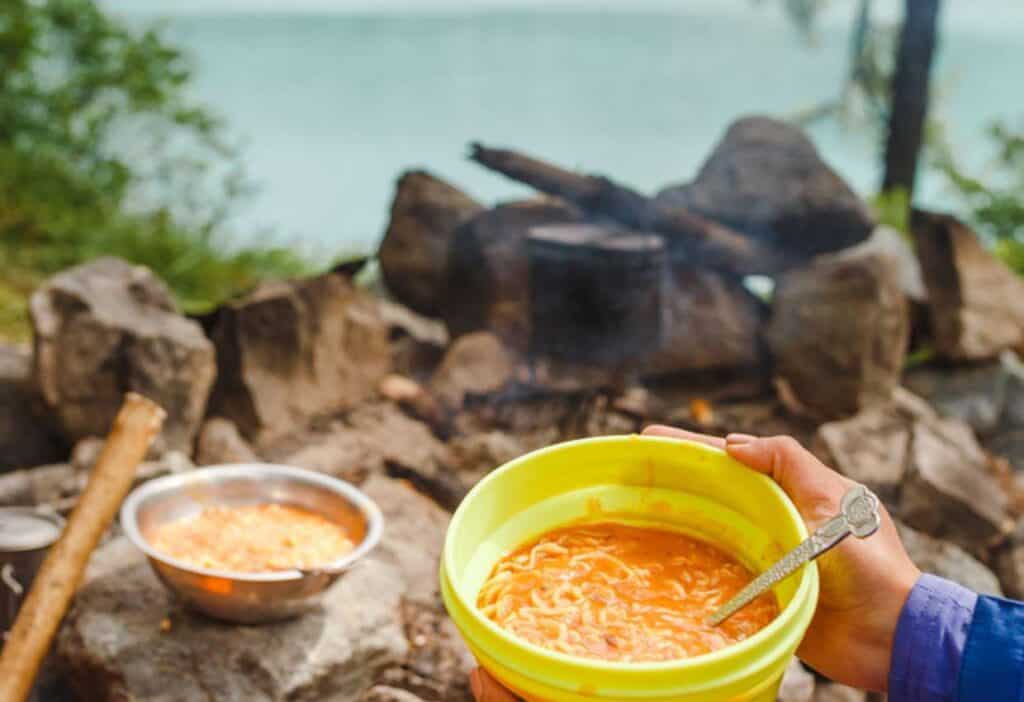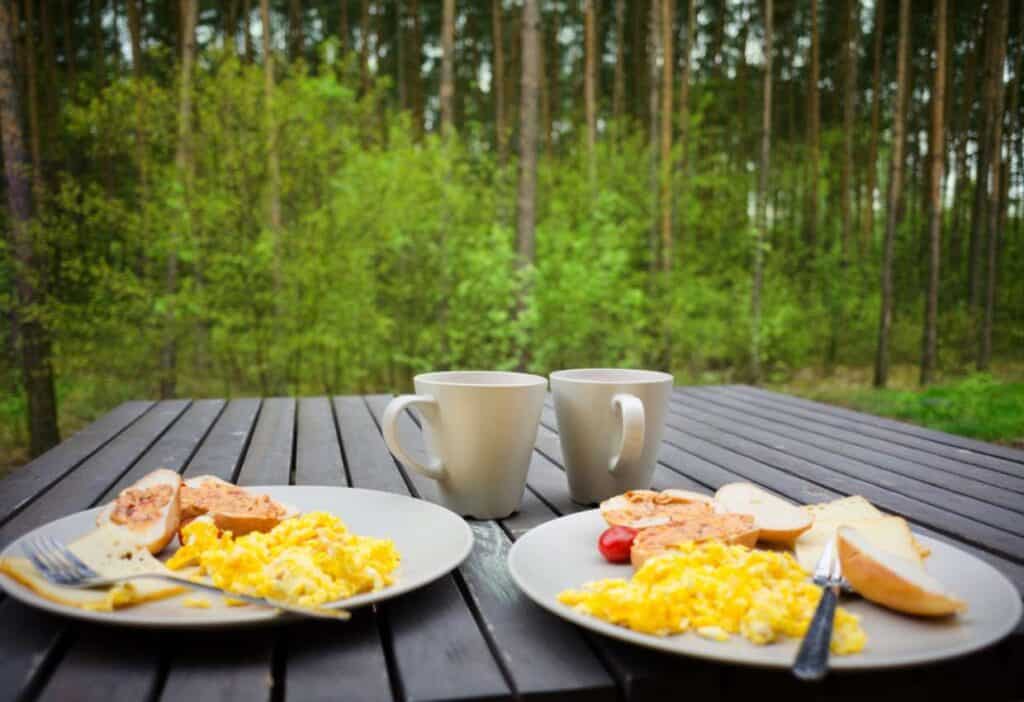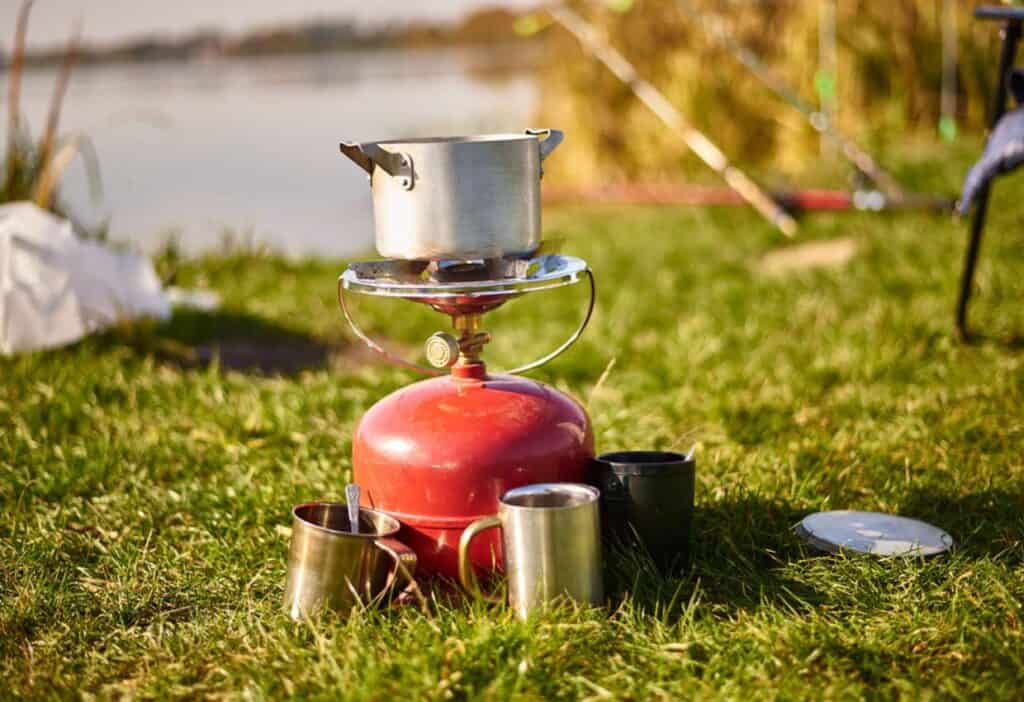When you pack for a camping trip, every ounce matters. That’s why these top dehydrated foods are a camper’s best friend. They’re light, easy to carry and simple to make.

Whether you’re a newbie or an experienced camper, understanding how to prepare and use dehydrated foods can make your outdoor adventures much more enjoyable.
This post may contain affiliate link(s). As an Amazon Associate, I earn from qualifying purchases. See Disclosures.
Why choose dehydrated camping foods
Dehydrated camping foods are a convenient, smart choice for several reasons. They last a long time, take up little space and turn into a complete meal with just the addition of water. Plus, they pack a lot of nutrients without the weight, which is essential when you have to carry everything on your back.
Top dehydrated camping foods
Here are some of the top dehydrated foods to take on your next camping trip. You’ll find something for every meal of the day.
Fully-prepared dehydrated dinners
After spending all day hiking, canoeing or soaking up the sun, it’s time to head back to your camping kitchen. You’ll find it’s much easier to warm up a dehydrated dinner than to make a full dinner over a campfire.
Beef stew and chicken curry are excellent choices for lightweight yet hearty camping dinners. Dehydrated beef stew and chicken curry give you everything you need in one pouch: protein, veggies and delicious flavors.
They’re easy to prepare. Add hot water, wait a few minutes, and you’ll have a hearty dinner. Choose these dehydrated camping dinners after a long day of hiking or canoeing.
Dehydrated breakfast options

When it comes to camping breakfasts, you can find various recipes online for dehydrated meals to make yourself. Alternatively, keep it simple and buy ready-made packages of dehydrated breakfast foods online or at your favorite local outdoor gear store.
The top two popular dehydrated camping breakfast foods are dehydrated eggs with bacon or vegetables and oatmeal with fruit. Both are good choices for starting your day with energy, and they’re super quick to make.
To prepare them, add hot water and stir; your breakfast is ready in minutes. Scrambled eggs or oatmeal with fruit are ideal for a quick, hot breakfast or even a mid-morning snack.
Dehydrated lunch ideas
Many of the light dinner or hearty breakfast options also work for lunches. Dehydrated lunch meals for camping, such as soup mixes, chili and noodles, make a light but satisfying meal, perfect for refueling in the middle of the day.
They’re perfect for a cool and rainy camping or hiking trip because they’re warm and comforting. Just boil water on your camp stove or campfire, mix the pouch contents with hot water, let it sit and your lunch is ready to go.
Dehydrated camping snacks
The dehydrated camping foods for snacks are a little different from the dehydrated meal suggestions. Instead of adding dried contents to hot water to rehydrate them, enjoy dried cranberries, fruit leathers or beef jerky right out of your pack for a quick energy boost or a treat while enjoying family camping games night.
Buy top dehydrated snacks online or at a camping supply store. Alternatively, make chicken jerky at home to pack on the trail for snacking during the day or short breaks. For a heartier, high-protein snack, make pemmican with wild game meat and berries.
“We camp a few times a year with the kids and always bring some beef jerky and dried mango. Both are delicious to munch on, easy to store and give you enough fuel for hikes and beach time without taking up too much space in your camping packs!”
— Shelby, Fit as a Mama Bear
Choose the right food for camping

Picking the right dehydrated food depends on the kind of camping you’ll do. If you’re backpacking, choose meals that are ultra-light and high in calories. For car camping, you may choose heavier options that are more about comfort and variety.
Here are a few tips for selecting dehydrated meals.
- Mix and match: Try combining different meals to keep your diet varied and balanced.
- Check the labels: Look for meals with fewer additives and more natural ingredients.
- Taste matters: Pick flavors that you know you’ll enjoy because a good meal can be a big morale booster in the wilderness.
How to store dehydrated foods when camping
Properly storing your dehydrated foods is key to keeping them fresh and tasty. Keep them in airtight containers or zip-lock bags to protect them from moisture and bugs.
If hiking in hot weather, store your food in a cool, shaded spot within your pack. Avoid leaving food in direct sunlight as heat can degrade its quality. Always make sure the seal is tight after each use to keep your food in the best condition.
Where to buy dehydrated camping foods
You can find top dehydrated camping foods at most outdoor supply stores or specialty camping stores. Many supermarkets also carry a selection in their camping or outdoor section. For a wider variety, check out online retailers who specialize in camping foods.
These retailers will offer various options, from simple meals to gourmet choices. Buying online can also provide you with customer reviews to help you choose the best meals for your adventure.
Making dehydrated camping foods
Make your own dehydrated camping foods to customize your meals and save money. Start by purchasing a good-quality food dehydrator.
You can dehydrate almost anything; fruits, vegetables and meats are some of the best foods to dehydrate. Slice fruits and veggies thinly for uniform drying.
Meats should be lean to avoid spoiling; pre-cook them before dehydrating to ensure safety. Season your foods lightly before drying as flavors intensify.
Store your homemade dehydrated foods in airtight containers, and they can last for months. Experiment with different recipes and combinations to create your perfect trail meals.
Dehydrated foods are a convenient option for many campers. They’re easy to prepare, nutritious and take up very little space in your backpack. Next time you plan a camping trip, consider these top dehydrated foods to keep your meals simple and satisfying.
Sarita Harbour is a long-time business and finance writer. She created An Off Grid Life to help people become more self-reliant.